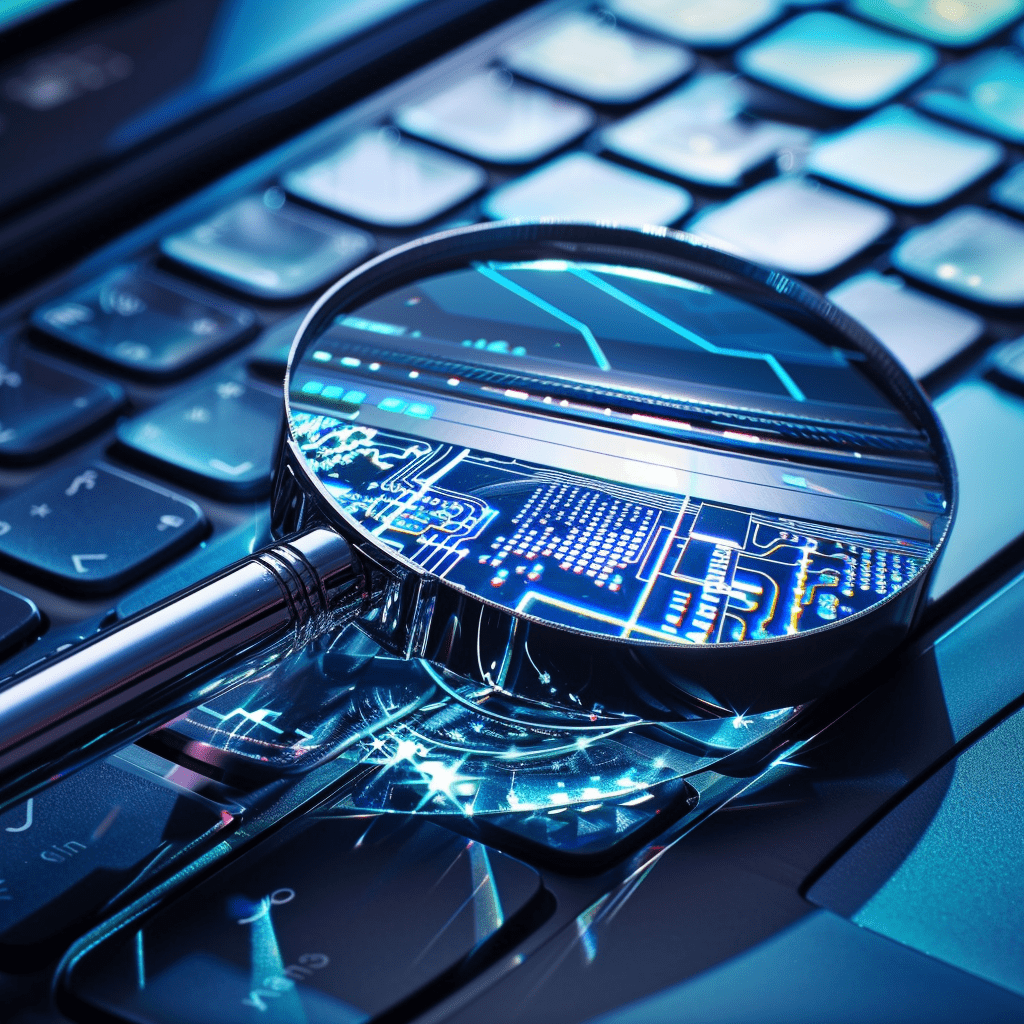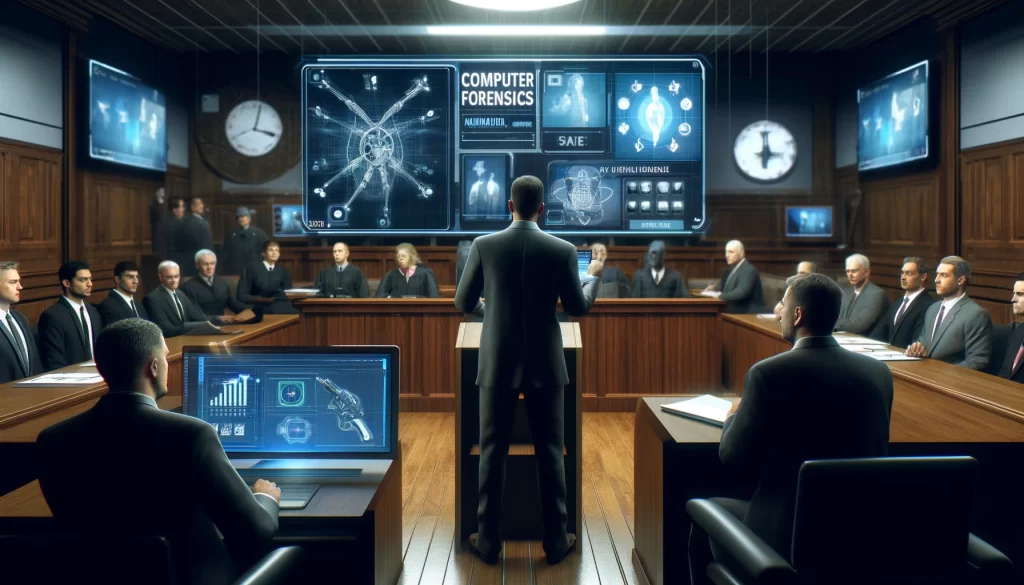How to Choose a Computer Forensics Firm: A Comprehensive Guide
How to Choose a Computer Forensics Firm: A Comprehensive Guide
Selecting the right computer forensics firm is crucial for ensuring the security and integrity of digital investigations. Whether you’re dealing with a data breach, intellectual property theft, or complex litigation, here are some key criteria to consider when choosing a reliable firm.

Technical Competence and Certifications
Certifications in computer forensics are more than just credentials; they validate expertise and demonstrate the practitioner’s dedication to maintaining high standards. When introducing digital evidence in court, the qualifications of forensic experts can directly impact the credibility and acceptance of the presented findings.
Why Certifications Matter
- Competence and Credibility: Certifications confirm that experts possess the necessary technical skills to analyze and interpret digital data accurately. They undergo rigorous training and assessments to earn these certifications, ensuring their methodologies are current and effective. Courts recognize these credentials as a benchmark for the expert’s competence.
- Courtroom Acceptance: Certified forensic examiners are more likely to have their testimony accepted in legal proceedings, as their qualifications demonstrate adherence to recognized standards. Digital evidence handled by certified professionals is less likely to face challenges or be dismissed due to poor data integrity or improper collection methods.
Key Forensics Certifications
- Cellebrite Certified Mobile Examiner (CCME): Specialists with this certification excel in mobile forensics, conducting comprehensive data extraction from smartphones, SIM cards, and cloud storage. It’s crucial for cases involving mobile device evidence.
- Certified Computer Examiner (CCE): CCE professionals have proven knowledge of forensic imaging, analysis, and reporting, making them ideal for examining computer systems for digital evidence.
- Certified Information Systems Security Professional (CISSP): CISSPs possess broad cybersecurity expertise and an understanding of protecting sensitive data and investigating breaches effectively.
- GIAC Certified Forensic Examiner (GCFE): This certification emphasizes evidence acquisition, Windows forensic analysis, and malware detection, providing vital skills for in-depth computer investigations.
The team at Cyber Centaurs holds multiple industry-recognized certifications, showcasing their commitment to excellence in digital forensics. Their certified professionals follow the highest standards, ensuring accurate analysis and maintaining data integrity in their investigations. With this expertise, their digital evidence stands up to the most rigorous scrutiny in court.
Comprehensive Suite of Services
A well-rounded computer forensics firm offers an extensive suite of services to cater to various investigative needs. Every investigation requires tailored methodologies based on the specifics of the incident. Here’s a closer look at the essential services that a competent firm should provide:
- Forensic Cloning and Data Recovery: Creating an exact, bit-for-bit copy of a digital device is crucial to preserve the original data for evidence purposes. Forensic cloning helps investigators analyze the digital footprint without altering the primary evidence. Data recovery is vital for retrieving deleted files, hidden computer activities, and other lost information that might be essential to an investigation.
- Web and Network Analysis: Investigating web history and network activity is key in tracking digital behavior, identifying malicious actors, and understanding the flow of information. It includes recovering browsing activity, detecting unauthorized file transfers, and revealing hidden digital interactions.
- Malware and Ransomware Analysis: Identifying and understanding malware or ransomware attacks require specialized expertise. The firm should offer advanced threat detection, reverse engineering, and analysis to understand the nature of these cyber threats and help mitigate their impact.
- Expert Witness Testimony: In legal proceedings, experts must provide clear, concise, and reliable testimony about digital evidence. A reputable firm will have court-tested experts who can explain complex technical processes to judges and juries, ensuring a comprehensive understanding of the findings.
- Corporate and Legal Investigations: Digital forensics extends to corporate environments, supporting internal investigations, regulatory compliance, and intellectual property theft. Firms should also have expertise in legal disputes, offering expert analysis to resolve trade secret theft, employee misconduct, and contractual violations.
- Data Breach Response: With data breaches becoming increasingly sophisticated, firms must rapidly respond to minimize data loss and identify the root cause. They should be equipped to handle incident response, ransomware cases, and advanced persistent threats efficiently.
When choosing a firm, ensure it provides these comprehensive services to address the multifaceted nature of digital investigations. An organization with a robust suite of services ensures a seamless, thorough approach to identifying, analyzing, and presenting crucial digital evidence.
Court-Tested Expertise
When digital evidence plays a crucial role in litigation, the expertise of a computer forensics firm must be able to withstand scrutiny in court. Legal proceedings require the digital forensic investigator to provide clear, accurate, and well-documented findings to ensure the evidence remains credible and admissible.

Here’s a deeper look into the importance of court-tested expertise:
- Qualified Expert Witnesses: Expert witnesses with court-tested experience are crucial for effectively presenting complex technical findings. They should have a proven ability to clearly explain digital evidence, the methodologies used in data acquisition, and the results of the analysis. A qualified witness will ensure the findings are understandable to judges and juries, translating technical jargon into layman’s terms through analogies, diagrams, and well-structured testimony.
- Cross-Examination Preparedness: Digital forensic experts must be prepared for challenging cross-examinations by opposing counsel. They need to anticipate possible rebuttals to their methods and conclusions. Court-tested experts develop this skill through prior experience, refining their ability to defend their methodology and findings against opposing arguments.
- Admissibility and Daubert Standards: The Daubert standard dictates that expert testimony must be relevant, reliable, and based on scientifically sound principles. An experienced forensic firm understands these requirements, providing evidence that consistently meets these criteria. They must document their investigation thoroughly, follow standard forensic practices, and maintain a proper chain of custody.
- Comprehensive Reporting: Beyond verbal testimony, forensic experts must also provide comprehensive, precise reports. These documents need to accurately reflect the methodologies used, detail the evidence acquisition process, and include a thorough analysis. An experienced firm will ensure these reports can withstand scrutiny and serve as crucial references during litigation.
- Expertise Across Various Jurisdictions: Court-tested professionals are versatile, with experience in both state and federal courts. Their adaptability ensures they can tailor their approach to meet different jurisdictions’ procedural requirements while ensuring adherence to local and federal laws.
When a firm has experts who have been court-tested, it confirms that their testimony and evidence are well-prepared to withstand rigorous challenges, ultimately providing judges, juries, and legal teams with reliable insights. This level of competence is vital for complex digital investigations where outcomes can hinge on the clarity and reliability of presented evidence.
Adaptable Collection and Analysis Techniques
In digital forensics, data collection and analysis flexibility is vital due to the diversity of devices and data sources involved. An effective forensics firm should offer adaptable techniques to efficiently capture and analyze evidence, whether on a traditional computer, mobile device or within cloud storage. Here are the key aspects:
- Remote vs. Onsite Data Collection: Investigations often require data collection from various geographic locations or even across international borders. Remote collection methods allow examiners to access and acquire digital evidence from anywhere globally with a stable internet connection. This is essential in scenarios where devices are inaccessible for physical collection. However, onsite collection may be necessary for situations requiring physical duplication of hard drives or other media. The firm must be adept at both methods to ensure comprehensive evidence-gathering.
- Cross-Platform Compatibility: Digital evidence is found across different devices, from computers and mobile phones to tablets and Internet of Things (IoT) devices. Analysis tools should be capable of accessing data from various operating systems, file formats, and network environments. The firm must have the technical ability to retrieve, analyze, and interpret data from all these sources without data loss.
- Device-Specific Collection Techniques: Different devices require specific methodologies due to varying levels of encryption, operating systems, and security protocols. For instance, mobile forensics may involve bypassing smartphone encryption or analyzing data from SIM cards and cloud backups. Similarly, computer forensics might require file system analysis or retrieving deleted or hidden files. The firm should have the skills and tools necessary to handle each device’s unique requirements.
- Chain of Custody Compliance: Maintaining a proper chain of custody is critical for evidence admissibility in court. Firms must employ meticulous documentation practices from collection through analysis to ensure the integrity of the evidence. This includes logging every individual who handles the evidence and tracking any modifications to avoid tampering allegations.
- Scalable and Tailored Analysis: Not all investigations require the same level of depth in data analysis. The firm should provide scalable solutions to meet the specific requirements of each case. This can range from rapid preliminary assessments to deep-dive investigations, depending on the matter’s sensitivity, complexity, and urgency.
- Advanced Analysis Tools and Techniques: Forensic analysis must include advanced tools and techniques like malware analysis, keyword searches, and pattern recognition. For complex breaches or incidents involving Advanced Persistent Threats (APTs), reverse engineering techniques and network analysis might be necessary to trace malicious activities and identify their origins.
By combining these adaptable collection and analysis techniques, a computer forensics firm can handle a wide array of investigations with precision and thoroughness, ensuring that digital evidence is reliable and admissible in any legal proceeding.
Rapid Response and Precision
In the realm of digital forensics, time is of the essence. Quick and accurate responses can mean the difference between minimizing damage and suffering catastrophic losses. Here’s how rapid response and precision play a critical role in digital investigations:
- Immediate Incident Assessment: Upon identifying a potential breach or threat, the firm’s incident response team needs to quickly assess the scope and nature of the incident. This involves understanding the threat vector, affected systems, and the potential impact on sensitive data. A rapid initial assessment ensures that the firm can implement containment measures to prevent further compromise while maintaining evidence integrity for forensic analysis.
- 24/7 Availability and Deployment: Cyber threats can occur at any hour. A reliable forensics firm maintains 24/7 availability and can quickly deploy experts to the affected site or conduct remote assessments if necessary. This availability allows organizations to swiftly secure compromised systems and mitigate potential data exfiltration, reducing the overall impact of the breach.
- Precision-Focused Data Acquisition: A rapid response must also be precise in identifying and securing relevant data. Forensic experts should quickly recognize which systems hold critical evidence and employ targeted data acquisition methods to ensure comprehensive and accurate analysis. Precision-focused acquisition helps limit the downtime of affected systems and ensures no vital data is overlooked.
- Containment and Remediation: While evidence is being collected, immediate steps are taken to contain the threat. This could involve isolating compromised devices, terminating unauthorized network connections, or identifying malicious software for removal. A firm that responds quickly can help clients avoid further data exposure and remediate vulnerabilities to prevent future incidents.
- Forensic Analysis and Reporting: After containment, forensic experts analyze the acquired evidence to understand the breach’s origin and progression. This analysis requires precision, as investigators must differentiate between malicious and benign activity. Detailed forensic reporting provides a clear timeline of events, identifies vulnerabilities, and suggests improvements to strengthen cybersecurity defenses.
- Legal and Compliance Alignment: Quick responses must also align with legal and compliance requirements. Data breaches and cyber incidents often require disclosure to authorities and affected stakeholders. Accurate documentation and evidence collection ensure that organizations meet regulatory requirements while providing reliable information for legal proceedings.
- Tailored Response Strategies: Different incidents require different strategies. For example, ransomware attacks might involve negotiating with attackers or retrieving backups to restore critical systems, while Advanced Persistent Threats (APTs) require deep analysis and long-term monitoring. A rapid response team should tailor their strategies to the specific threat type, ensuring the appropriate countermeasures are deployed swiftly and effectively.
By emphasizing rapid response and precision, a digital forensics firm can quickly contain threats and gather valuable evidence within discovery deadlines, giving organizations clear, actionable insights. This helps them recover from incidents with minimal disruption, leads to more robust safeguards against future attacks, and improves litigation outcomes.
Client-Centric Approach
A client-centric approach is the cornerstone of any reputable computer forensics firm. It involves understanding the unique needs of each client and tailoring services to provide personalized solutions, clear communication, and exceptional support. Here’s how a client-centric focus makes a difference:
- Tailored Solutions: Every investigation is unique, and a firm must offer solutions that align with the client’s specific needs, whether it’s a data breach, intellectual property theft, or internal employee investigation. This tailored approach ensures that the analysis is precise, relevant, and directly addresses the client’s objectives, leading to more actionable outcomes.
- Clear Communication: A client-centric firm prioritizes transparent and regular communication, guiding clients through the intricacies of digital investigations. Forensics professionals should explain technical findings in a way that non-technical stakeholders, including legal teams, executives, and judges, can understand. This clarity fosters trust and ensures that clients can make informed decisions based on the findings.
- Flexible Coordination: Legal disputes and digital incidents often require rapid and flexible coordination between the client and the forensics firm. A client-focused approach involves accommodating tight deadlines, changing priorities, and providing seamless support to address new challenges that arise during an investigation.
- Confidentiality and Ethical Standards: Protecting sensitive information is paramount in digital investigations. Firms must adhere to the highest ethical standards, ensuring client confidentiality throughout the collection, analysis, and reporting stages. This builds confidence that the firm’s processes will not compromise the client’s sensitive data.
- Resource Provision: Providing clients with resources such as whitepapers, best practice guidelines, and post-incident remediation plans adds value beyond immediate investigations. By educating clients about risk mitigation and forensic strategies, firms empower organizations to improve their security posture and reduce the likelihood of future incidents.
- Long-Term Partnership: A client-centric approach extends beyond a single investigation. Firms should establish long-term partnerships with clients, offering periodic reviews, cybersecurity advice, and assistance in developing internal policies. This sustained relationship helps organizations stay prepared for evolving threats and strengthens their overall resilience.
- Legal Support and Testimony: For cases that proceed to litigation, client-focused firms must offer expert witnesses capable of providing credible testimony. They ensure that evidence is admissible and assist clients in understanding legal strategies, helping them navigate the complexities of presenting digital evidence in court.
Choosing the Right Computer Forensics Firm
Selecting a computer forensics firm requires assessing technical expertise beyond just computer forensics services and should include mobile forensics, cloud forensic capabilities, adaptability, and client commitment. These criteria ensure that your organization receives the most effective support during a digital investigation.
Look for certifications like Cellebrite or GIAC, which demonstrate a team’s advanced knowledge in data recovery, mobile device forensics, and malware analysis. Certified experts are adept at finding hidden digital footprints, ensuring that no evidence is overlooked. Cyber Centaurs exemplifies this expertise with its team of certified professionals, offering precise, court-admissible results.
Adaptability ensures the firm can customize its approach to fit the specific needs of your case, whether it’s a data breach or expert witness testimony. Firms like Cyber Centaurs provide tailored services ranging from rapid data collection to comprehensive analysis, working onsite or remotely, and adjusting to different devices and data formats.
A firm that prioritizes transparency and client-centric communication helps foster trust and confidence. Cyber Centaurs is known for keeping clients informed throughout the process and offering valuable resources to improve cybersecurity defenses.
By evaluating technical expertise, adaptability, and client commitment, you’ll identify a firm like Cyber Centaurs that provides the precise, flexible support needed for your digital investigation.




